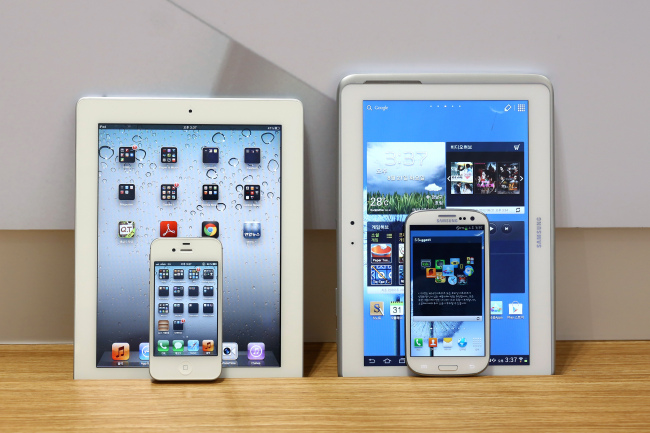 |
An Apple Inc. iPad 2 and iPhone 4S smartphone, left, and a Samsung Electronics Co. Galaxy Tab 10.1 tablet computer and Galaxy S III smartphone are arranged for a photograph in Seoul, South Korea, On Tuesday. (Bloomberg) |
Seoul court says Apple infringed two Samsung patents, Samsung violated one of Apple’s
A Seoul court on Friday ruled in favor of Samsung Electronics against Apple Inc., ordering a sales ban on smartphones iPhone 3GS and iPhone 4 as well as the iPad and iPad 2 for patent infringement.
The Seoul Central District Court also said Samsung is prohibited from selling its Galaxy S2 and the Galaxy Tab 10.1 in Korea for infringing on Apple’s intellectual property involving user interface.
The court’s sales ban order indicates that both firms must put all of their listed gadgets into disposal and they cannot display them anywhere nationwide.
The event took place after a Seoul court, led by Judge Bae Joon-hyun, ruled that Apple infringed on two of Samsung patents, while Samsung also violated one Apple patent.
Being noted as the world’s biggest patent battle staged by the two IT giants,
Samsung had filed to the Seoul court that its rival Apple infringed on four wireless communications patents as well as one user interface patent.
Apple has also claimed Samsung had infringed on four of its user interface patents and six design-related patents.
The two firms both requested 100 million won ($88,170) in damages.
“Apple has violated two of Samsung’s wireless telecommunications patents and it must pay 20 million won for each of the patents involved,” said Bae.
“Samsung must also pay 25 million won to Apple as it has infringed one of Apple’s patents.”
Samsung did not release an official statement on Friday, with another court battle scheduled in the U.S. early Saturday, Korean time.
The court, however, denied that Samsung had copied Apple’s design as it rejected the violation of the U.S.-based firm’s six design-related patents.
Those included Apple’s claims that Samsung’s Galaxy smartphones copied its iPhone design of a rectangular-shaped smartphone with round corners and a home button below the center of the display screen.
The Cupertino-based company also said Samsung’s memo and phone call icons looked similar enough to say the latter has challenged its design patent.
The court’s rejection of Apple’s design infringement claims were inevitably good news for the Korean electronics maker as well as court’s recognition of wireless communications technology patents.
“Samsung started the overseas court battle to get rid of the ‘copycat’ image repeatedly spoken by Apple and this was a beginning step,” said an industry source. “What we’re also aware of is that Apple will need to use Samsung’s wireless communications patents, which were ruled to have infringed on its rival’s intellectual property, for their upcoming lineup of smartphones.”
The two wireless communications technology-related patents, pointed out by the Seoul court, are those that involve technologies which upgrade the efficiency of data delivery for wireless devices.
The patent dubbed “975” is one that makes aware the mode of data delivery for the wireless gadgets and the other dubbed “970” is technology involving the transmission and reception of packet data, according to court documents.
With the decision in place, the two will now face off at a U.S. court in San Jose early Saturday as the nine-member jury panel gets ready to release a verdict on the case that has lasted about a month.
What has been known so far is that the jury charged with evaluating the multibillion dollar case decided to work an extra hour on Thursday local time there.
With none of them having any knowledge in IT, they have to come up with a conclusion on five Samsung patents related to cellular technology and seven Apple patents covering design and user interface.
“The task may seem simple, but I’m aware that the jury panel has to make 700 individual decisions and that they have to unanimously agree on all of them,” said a local industry insider. “This is why we don’t have the slightest idea on how this will turn out but I’m expecting the two parties -- Samsung and Apple -- to come to a compromise in the end, whether it is now or further down the road.”
By Cho Ji-hyun
(sharon@heraldcorp.com)







![[Today’s K-pop] Blackpink’s Jennie, Lisa invited to Coachella as solo acts](http://res.heraldm.com/phpwas/restmb_idxmake.php?idx=644&simg=/content/image/2024/11/21/20241121050099_0.jpg)